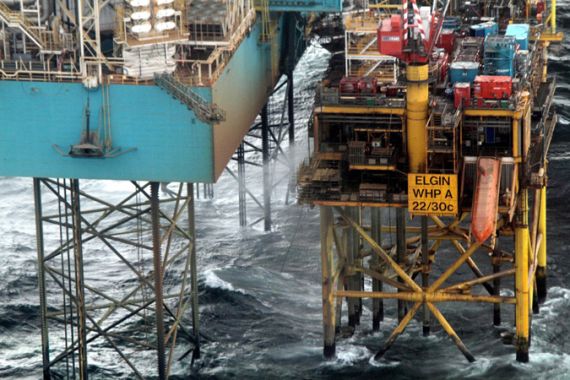North Sea gas flame ‘extinguished’
Total to begin drilling operation to stop leak, while Greenpeace says it will send monitors to assess ecological damage.

A flare that had threatened to cause an explosion at a North Sea platform leaking flammable gas has gone out, according to French oil giant Total.
“We can confirm that the flare has been extinguished,” Total spokesperson Brian O’Neill told the AFP news agency on Saturday from the company’s crisis centre in Aberdeen, 240 kilometres from the offshore Elgin platform that was evacuated this week.
Keep reading
list of 4 itemsAfter the Hurricane
World’s coral reefs face global bleaching crisis
Why is Germany maintaining economic ties with China?
“It extinguished itself, which is what we expected to happen.”
O’Neill said a surveillance flight on Friday gave the first indications the flame had gone out, and on Saturday morning the company’s boats confirmed that it had not burned all night.
The oil company is bringing two drills to the area to sink two relief wells to stop the gas leak, which was first spotted on Sunday, in parallel with a plugging operation to pump so-called “heavy mud” into the stricken well at high pressure.
“Once they’re there, we’ll have to do preliminary work before we start drilling, such as surveys to assess the seabed,” O’Neill said.
“This takes a little time. The preliminary work has started already, but it will be seven to 10 days before we are in a position to start drilling.”
Meanwhile, environmental rights group Greenpeace said it would send a research vessel to the Elgin platform to monitor the coming cleanup operation.
“Because of Total’s insufficient information policy the independent ecological organisation has decided to evaluate the situation on the spot,” the group said in a statement on Friday.
Greenpeace said experts on board the ship would take samples to measure air, water and soil pollution.
They would also try to find the gas leak using an infrared camera to check on the information from Total.
Worker safety
Union representative Jake Molloy said that Total had repeatedly assured workers that a leak was impossible until just hours before evacuating them.
The last of Elgin’s 238 crew were evacuated on Monday, where safety concerns among workers aboard the platform were raised but repeatedly ignored, Molloy said.
“The workforce were repeatedly told that a failure in Annulus C [the pipe casing] could not happen and even if it did, a design feature would prevent a gas leak.
“Several discussions between workers and Total technical authorities happened throughout the preceding weeks, up to and including a few hours before the event,” he said.
There had been fears that the plume of gas, which was leaking from the base of the platform at a rate of 200,000 cubic metres per day, could come into contact with the naked flame and ignite, causing a massive explosion.
Even so, the company and UK authorities have said they expect “minimal” environmental impact from the gas leak.
On Friday the UK government said Total’s response to the incident had been very effective, noting the platform was evacuated in three and a half hours.
Total, which has seen around $10bn wiped off of its stock value since Monday, has described the accident as its worst problem in the North Sea in a decade.